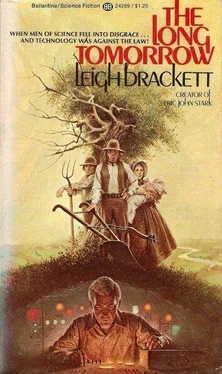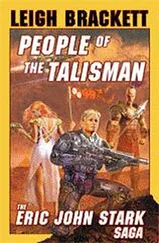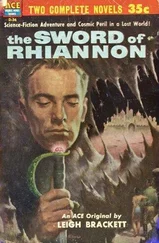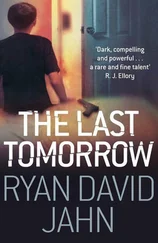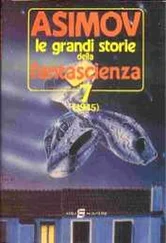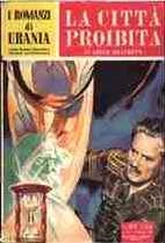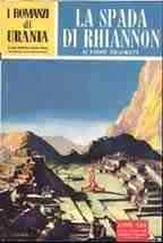“A thing once known always comes back.”
“And the cities will come back too.”
“In time, inevitable.”
“And it will all happen over again, the cities and the bomb, unless you find that way to stop it.”
“Unless men have changed a lot by tomorrow, yes.”
“Then,” said Len, still frowning, still somber, “then I guess you’re trying to do what ought to be done. I guess it might be right.”
The word stuck to his tongue, but he got it off, and no bolt of lightning came to strike him dead, and Sherman did not challenge him any further.
Esau had moved toward the panel, magnetized by the lure of the machine. He reached hesitantly out and touched it, and asked, “Could we see it work?”
It was Erdmann who answered. “Later. She’s just finished a three-year project, and she’s shut down now for a complete overhaul.”
“Three years,” said Gutierrez. “Yes. I wish you could shut me down too, Frank. Pick my brain to pieces and put it together again, all fresh and bright.” He began to raise and lower his fist, striking the panel each time, lightly as a feather falling. “Frank,” he said, “she could have made a mistake.”
Erdmann looked at him sharply. “You know that isn’t possible.”
“A vagrant charge,” said Gutierrez. “A speck of dust, a relay too worn to function right, and how would you ever know?”
“Julio,” said Erdmann. “You know better. If the slightest thing goes wrong with her she stops automatically and asks for attention.”
Sherman spoke, and the talking stopped, and everybody began to move out into the passageway again. Gutierrez came close behind Len, and even through the doubt and fear that clouded in so thick around him Len could hear him muttering to himself, “She couldhave made a mistake.”
Hostetter was a lamp in the darkness, a solid rock in the midst of flood. He was the link, the carry-over from Piper’s Run to Bartorstown, he was the old friend and the strong arm that had already reached out twice to save him, once at the preaching, once at Refuge. Len clung to him, mentally, with a certain desperation.
“You think it’s right?” he asked, knowing the inevitable answer, but wanting the assurance anyhow.
They were walking down the road from Bartorstown in the late afternoon. Sherman and the others had lingered behind, perhaps deliberately, so that Hostetter was alone with Len and Esau. And now Hostetter glanced at Len and said, “Yes, I think it’s right.”
“But,” said Len softly, “to workwith it, to keep it going—”
He was out in the open air again. The mountain was away from over his head, and the rock walls of Bartorstown no longer shut him in, and he could breathe and look at the sun. But the horror was still on him, and he thought of the destroyer crouched in a hole of the rock, and he knew he did not want ever to go back there. And at the same time he knew that he would have to go whether he wanted it or not.
Hostetter said, “I told you there’d be things you wouldn’t like, things that would jar against your teachings no matter how much you said you didn’t believe them.”
“But you’re not afraid of it,” said Esau. He had been thinking hard, scuffing his boots against the stones of the road. Up above them on the east slope was the normal, comforting racket of the mine, and ahead the village of Fall Creek drowsed quietly in the late sun, and it was very much like Piper’s Run if there had been a devil chained in the hills behind it. “You went right up and put your hands on it.”
“I grew up with the idea of it,” said Hostetter. “Nobody ever taught me that it was evil or forbidden, or that God had put a curse on it, and that’s the difference. That’s why we don’t take strangers in but once in a coon’s age. The conditioning is all wrong.”
“I ain’t worrying about curses,” said Esau. “What I worry about is, will it hurt me?”
“Not unless you find some way to get inside the shield.”
“It can’t burn me.”
“No.”
“And it can’t blow up.”
“No. The steam plant might blow up, but not the reactor.”
“Well, then,” said Esau, and walked on awhile in silence, thinking. His eyes got bright, and he laughed and said “I wonder what those old fools in Piper’s Run, old Harkness and Clute and the rest, would think. They were going to birch us just for having a radio, and now we’ve got that. Jesus. I bet they’d kill us, Len.”
“No,” said Hostetter somberly, “they wouldn’t. But all the same, you’d wind up like Soames, at the bottom of a pile of stones.”
“Well, I ain’t going to give them a chance. Jesus! Atom power, the real thing, the biggest power in the world.” His fingers curled with greedy excitement and then relaxed, and he asked again, “Are you sureit’s safe?”
“It’s safe,” said Hostetter, getting impatient. “We’ve had it for nearly a century, and it hasn’t hurt anybody yet.”
“I guess,” said Len slowly, leaning his head against the cool wind and letting it blow some of the darkness out of him, “we don’t have any right to complain.”
“You sure don’t.”
“And I guess the government knew what it was doing when it built Bartorstown.”
They were afraid too, whispered the cool wind. They had a power too big for them to handle, and they were afraid, and well they should have been.
“It did,” said Hostetter, not hearing the wind.
“Jesus,” said Esau, “just think if they had found that thing to stop the bomb.”
“I’ve thought,” said Hostetter. “We all have. I suppose every man in Bartorstown has a guilt complex a mile wide from thinking about it. But there just wasn’t time.”
Time? Or was there another reason?
“How long will it take?” asked Len. “It seems like in almost a hundred years they should have found it.”
“My God,” said Hostetter, “do you know how long it took to find atomic power in the first place? A Greek named Demcoritus got the basic idea of the atom centuries before Christ, so you can figure that out.”
“But it ain’t going to take them that long now!” cried Esau. “Sherman said with that machine—”
“It won’t take them that long, no.”
“But how long? Another hundred years?”
“How do I know how long?” said Hostetter angrily. “Another hundred years, or another year. How do I know?”
“But with the machine—”
“It’s only a machine, it’s not God. It can’t pull an answer out of thin air just because we want it.”
“How about that machine, though,” said Esau, and once more his eyes were glistening. “I wanted to see it work. Does it really—” He hesitated, and then said the incredible word. “Does it really think?”
“No,” said Hostetter. “Not in the way you mean the word. Get Erdmann to explain it to you sometime.” Suddenly he said to Len, “You’re thinking that only God has any business building brains.”
Len flushed, feeling like what Sherman had called him, a conscience-ridden farm boy in the face of these men who knew so much, and yet he could not deny to Hostetter that he had been thinking something like that.
“I guess I’ll get used to it.”
Esau snorted. “He always was a doubtful-minded kind, taking forever to make up his mind.”
“Why, God damn you, Esau,” cried Len furiously, “if it hadn’t been for me you’d still be shoveling dung in your father’s barn!”
“All right,” said Esau, glaring at him, “you remember that. You remember whose fault it is you’re here and don’t go whining around about it.”
Читать дальше
